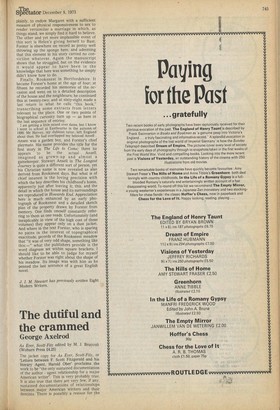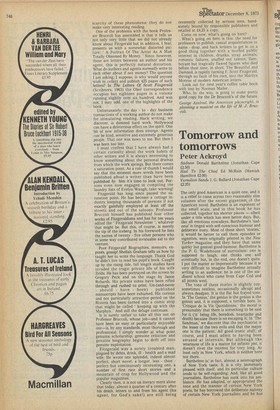The dutiful and the crammed
George Axelrod
As Ever, Scott-Fitz edited by M. J. Bruce°li. (Woburn Press £4.25) The jacket copy for As Ever, Scott-Fitz, or 'Letters between F. Scott Fitzgerald and his literary Agent, Harold Ober' proclaims the work to be "the only sustained documentation of the author agent relationship for a major American writer". This is very probably true. It is also true that there are very few, if any, sustained documentations of relationships between major American winters and their dentists. There is possibly a reason for the
scarcity of these phenomena: they do not make very interesting reading.
One of the problems with the book Professor Bruccoli has assembled is that it tells us not only very little that we did not already know about Fitzgerald but in addition, I fear, presents us with a somewhat distorted pic ture: ' A Portrait Of The Artist As A Man Totally Obsessed By Money. ' Since, however, these are letters between an author and his agent, this is perfectly natural distortion.
What do authors and agents normally write to each other about if not money? The question
I am asking, I suppose, is why would anyone
wish to collect and publish 425 pages of such letters? In The Letters Of Scott Fitzgerald
(Scribners, 1963) the Ober correspondence occupies but eighteen pages in a volume running slightly over six hundred. And was not. I may add, one of the highlights of the book.
Unfortunately, the day to day business transactions of a working author do not make for stimulating reading. Hack writing, we discover, is damned hard work. Hollywood can have a deleterious effect on the spirit. One
bit of new information does emerge. Agents can be kind, sensitive and extremely generous people. That one was news to me, But then I was born too late. I must confess that I have always( had a certain curiosity about the work habits of
other writers and it is always interesting to know something about the personal dramas from which the work springs. But there comes
a saturation point. As a rule of thumb I would say that the moment more words have been published about a writer than have been published by him it's time to look .out. Per
sons even now engaged in compiling the laundry lists of Evelyn Waugh, take warning! Fitzgerald has long since passed the saturation point. He has become a cottage in dustry keeping thousands of persons if not exactly gainfully employed at least off the streets and out of the saloons. Professor Bruccoli himself has published four other works of Fitzgeraldiana and has for ten years edited the ' Fitzgerald Newsletter ', whatever that might be. But this, of course, is merely the tip of the iceberg. In his foreword he lists the names of twenty five other persons who in some way contributed invaluable aid to the venture.
Poor Fitzgerald! Biographies, memoirs, exposds, gossip! Sheilah Graham tells us how he taught her to write the language. Thank God he didn't live to read his pupil's book. Caught up by the rising tide, full length studies have invaded the tragic private life of his wife Zelda. He has been portrayed on the screen by Gregory Peck and on the stage by Jason Robards. His private notes have been rifled
through and rushed to print. Un-(and-never should have been) published
manuscripts have been exhumed. His curious and not particularly attractive period on the Riviera has been turned into a comic strip that might be called ' keeping up with the Murphys. 'And still the deluge continues.
It is surely unfair to take all this out on Professor Bruccoli, whose job—and it cannot have been an easy or particularly enjoyable one—is, by any standards, most thorough and professional. I simply wonder at what point genuine scholarship, genuine criticism and genuine biography begin to drift off into genuine exploitation.
Fitzgerald was a sorely troubled man, plagued by debts, drink, ill health and a mad wife. He wrote one splendid, indeed almost perfect, short novel, a longer, less than perfect but continuously interesting one, a number of first rate short stories and a mountain of crap for Hollywood and the popular magazines.
Clearly then, it is not on literary merit alone that today, almost a quarter of a century after
his death, letters to and from his agent (his agent, for God's sake!) are still being
reverently collected by serious men, handsomely bound by responsible publishers and retailed at £4.25 a copy.
Come on now, what's going on here?
What's going on here is this: the need, for professors to publish, casual acquaintances to name drop, and hack writers to get in on a good thing together with a morbid public interest in children, drunks, stray animals, romantic failures, snuffed out talents, flamboyant but tragically flawed figures who died before their time, in short, The Beautiful and Damned, is rapidly turning F. Scott Fitzgerald, through no fault of his own, into the Marilyn Monroe of modern American letters.
Look out for next year's coffee table book with text by Norman Mailer.
Who, by the way, is going to make pretty good copy( for the Dr Bruccoli's of the future.
George Axelrod, the American playwright, is planning a musical on the life of M. J. Bruccall.











































 Previous page
Previous page